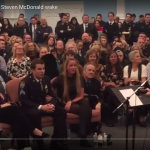 The following is the text of the Christopher News Note “Opening Yourself to God’s Grace” (which was written by a freelancer). If you’d like a pdf or hard copy, see the end of this post:
The following is the text of the Christopher News Note “Opening Yourself to God’s Grace” (which was written by a freelancer). If you’d like a pdf or hard copy, see the end of this post:
Grace has a way of sneaking up on us and, if we’re not paying attention, slipping right past us.
Although it’s hard to define, we typically recognize grace after the fact, in the people and events that show up on our life journey just when we need them most—or maybe when we don’t want them at all but need them despite our objections. Grace can be both mystical and maddening, in-your-face and ever-elusive, transforming and tenuous. Grace is the Spirit moving through our lives, a touch of the divine within our grasp. How would you define grace? It’s not an easy question. In fact, it’s one that can sometimes even make a spiritual person squirm because it can force us to give concrete qualities to an ineffable reality.
Defining Grace
“After years teaching religion to seventh- and eighth-graders, I have asked many students to write flashcards defining the word ‘grace,’ and the definition we usually work with is ‘friendship with God’ or ‘participation in the life of God.’ Grace is a gift of God, but it is not simply the presence of God, whom we know is always present,” says Margaret Felice, a soprano, religious educator and blogger based in New England. “Grace involves our response to that presence, our awareness of it, and our entering into it. When I am made aware of God in a particular way, that is a moment of grace.”
Felice’s family suffered a terrible loss a few years ago, with two family members dying sudden and violent deaths. Although she says the experience was “shattering,” she also found moments of grace in the midst of it. “I found God in so many places: in the strength and faith of my family members, in the mercy I found in my own heart, and in the way our brokenness was knit back together. These were brutal lessons that I would rather not have had to learn, but there was a sacredness in them,” she says. “Dealing with my own illness for the last three years, I am still exploring the way that my wounds bind me closer to Christ. I don’t always recognize it and even when I do I can’t really articulate it, but those flashes of union are deep. I too am blessed and broken.”
For Felice, who has degrees in theology and music, recognizing grace takes regular practice. “The first step for me is getting out of myself and my own concerns and simply observing the world around me. I am more likely to be gobsmacked by grace at a random moment during the day than to experience it deeply during times of intentional private prayer, but I still try to be disciplined about making time for prayer so that I balance those two opportunities: finding God in the everyday, and setting aside specific moments to cultivate that relationship.”
Bishop Edward Scharfenberger of Albany describes grace as “a favor, a free love-gift from God that is unearned.” He continues, “In its most fundamental sense, grace is the gift of God’s own self. As creator, however, God is free to give us graces in various modes or forms such as sacramental grace, which is built-in, so to speak, to a specific sacrament — or actual grace, which is spontaneously crafted by God as a personal gift. Every kind of grace offered, if freely accepted—which is always necessary — draws the receiver into the very life and mystery of God.”
People who are tuned into grace will often tell others to “watch” for moments of grace to appear in their lives, to open their minds to the transcendent possibilities that are sometimes obscured by our own agendas, plans, and busyness. If you think back on your life, you are likely to spot moments of supernatural grace that you hardly gave a second thought at the time. The real gift is when we spot those moments as they happen, aware of God’s presence in the day-to-day moments of our lives. “My greatest ‘moments of grace’ are in looking back and realizing the grace I received,” admits Bishop Scharfenberger, who remembers how difficult it was for him to give up smoking when he was in his twenties. Now, however, he realizes that his struggles at the time gave him insight into the problem of addiction, which has made him better able to accompany others through their own ups and downs with addictive behavior.
Amazing Grace, How Sweet the Sound
John Newton was a sailor and slave trader known as “The Great Blasphemer.” His coarseness was the stuff of legend, but one day in 1848 when he was at the helm of a ship battered by a brutal storm, something changed. He recalled later that “[o]n that day the Lord sent from on high and delivered me out of deep waters.” From that day on, he began to pray and study Scripture, and slowly his life was transformed. He even became an advocate for abolishing the slave trade.
Newton eventually became a minister and would write hymns for his congregation as part of his larger lesson for the week. Out of that practice came the hymn most of us can sing without needing a song sheet: “Amazing grace! How sweet the sound that saved a wretch like me. I once was lost but now am found; was blind but now I see.” Each of us has at least a smidgen of John Newton living somewhere deep down inside, a person in need of saving. If we are open to grace, if we believe as Newton came to believe, despite all our outward flaws, grace will appear and lead us home.
Learning to Be Grace-Full
“My grace is sufficient for you, for power is made perfect in weakness.” — 2 Corinthians 12:8-9
Denise Bossert, syndicated columnist and Catholic author, says that, in her life, grace has led to conversion — her own, her husband’s, her two daughters’, and her grandsons’ baptisms. She has even seen grace intervene and change the direction of her career, opening doors to writing and sending her on journeys she never planned to make to places like the Holy Land, Jordan, Poland, and Mexico.
“Grace has changed a mundane day into a day bursting with activity. It has also changed a day I thought would be packed with activity and rendered it quiet and incredibly peaceful,” she says. “But it’s not fate or randomness, because the changes themselves fit like pieces of a puzzle into the greater picture. Grace is like that — a puzzle piece that looks like it doesn’t belong. And then, you realize that it does. Perfectly.”
Bossert says that grace is when God shows up and she can sense His presence. She sees things a little clearer, has a stronger sense of which direction to take and a richer sense of purpose. “Hans Urs Von Balthasar wrote this great book ‘Truth is Symphonic.’ The premise is that truth comes to us in a number of different ways and that we know it because it sounds like instruments playing together in a symphony. It works together, makes sense together, fits together. Grace is like that. It comes from a number of different venues — though God is the source of it all,” Bossert explains. “God speaks something to my heart, and it comes again from another place or another person. But it is the same voice, God’s voice. And all the sounds of grace come together and fit together and make sense together. So, at the risk of mixing metaphors, it’s like the swell of music in a symphony, and it is also like a tidal wave. A sea of grace.”
Grace even finds its way into song lyrics and rock performances. Bono, front man for the band U2, has written a beautiful song about grace, with words that get to the heart of its complexity: “Grace makes beauty out of ugly things. Grace finds beauty in everything.” In an interview on the topic, Bono, who often talks about his own faith life and his relationship with Jesus, says what keeps him on his knees is the “difference between karma and grace.”
Pointing to the world’s eye-for-an-eye mentality, he says the grace of God turns all of that on its head. “Along comes this idea called grace to upend all that ‘as you reap, so you will sow’ stuff. Grace defies reason and logic,” Bono explains. “Love interrupts, if you like, the consequences of your actions, which in my case is very good news indeed, because I’ve done a lot of stupid stuff.” The Catechism of the Catholic Church says that grace is the “free and undeserved help that God gives us.” So how do we make sure we don’t have our eyes closed when grace shows up in our lives?
States of Grace
“For grace is given not because we have done good works, but in order that we may be able to do them.” — St. Augustine of Hippo
Most experts say that the only way to ground our lives in grace is through prayer. Without it we cannot hear God’s voice above the din of daily life and our own desires. “It’s indispensable. Prayer is turning our face to God. Unless we let God look at us—and into us— how can we accept we will ‘see’ the grace we want or need?” asks Bishop Scharfenberger. “It’s all about trusting God to be God and recognizing that we are in relationship with a God who IS Love itself. I think we miss grace whenever we treat God in a mechanical way, attempting to control the goods God has to give as if God were a faucet or a vending machine. It’s good to ask God for favors, of course, and God will always answer our prayers in the way that is best for us. But we have to let God be God and be willing to let go so that God can change us, so we are able to receive the grace in store for us.”
To receive a pdf or mailed copy of “Opening Yourself to God’s Grace” – or to subscribe to Christopher News Notes via email or snail mail – send your request to [email protected]











